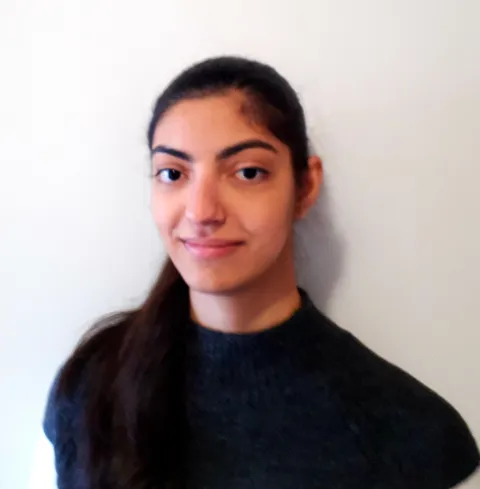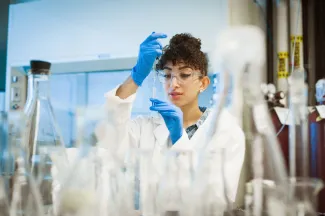"Treat each challenge as an experience to learn from, instead of a problem to work through."

Marina Najm
- Degree:
- Master of Applied Science
- Grad year: 2021
- Program:
- Campus: Vancouver
I have completed both a Bachelor of Applied Science and a Master of Applied Science degree in Chemical and Biological Engineering at UBC. I have adapted to a lot of changes from immigration to a long commute and balancing family responsibilities. During this time, I have committed to the high academic standards in my coursework and research, which have earned me multiple scholarships including NSERC CGS-M and the BC Graduate Student Scholarship. I enjoy learning about new methods and materials, and I always seek new places or hobbies that can show me a new aspect of life to experience.
Why did you choose to go into your field of study at UBC?
I have always enjoyed finding the correct way to put a puzzle together or to find the right way out of a maze. This mindset is what led me to engineering, where there is usually an optimal, most efficient way to solve a problem. Among the different engineering fields, I was looking for a chance to do some hands-on experiments and a field that allowed me to later have a direct impact on the environment and our quality of life. I found Chemical and Biological Engineering to have a wide range of potential applications such as renewable energy, process engineering, and material optimization. I also got the chance to experiment with corrosive chemicals and sticky plastics, which made the work itself very fun and almost playful.
What has made your time at UBC memorable?
The memorable moments from my degree program are when I felt an increased level of independence, responsibility, and trust from my colleagues, friends, and professors. I have spent a total of seven years at UBC; I have gotten to know the research being done, gain specific expertise during my graduate studies, and take on several projects I couldn’t have done without the guidance and knowledge I gained during my degree.
Also, as a teaching assistant, I was able to support undergraduate students through their process of problem solving in engineering courses over two years. Sharing my experiences with them after having successfully completed the same courses they are taking was very fulfilling. I appreciate the supportive teaching team I was fortunate to learn from, and I am pleased to have contributed my experiences with students who appreciate my help.
Tell us about your experience in your program. What have you learned that is most valuable?
The experiences that surround the core part of my degree have been very impactful. Attending a research conference, refining my presentation and public speaking skills, and collaborating with other teams and research groups all provided me with skills I use now in my career and will continue to use in the future. In addition, I was living two hours away from campus and had to commute a total of four hours each day, which definitely built my discipline and time management skills but also required a lot of patience and determination. The challenges have built my tolerance towards uncomfortable situations. Committing to something important through the physical and mental hardships has taught me to appreciate the efforts that I myself and many others put in to achieve a value or a goal we believe in.
What advice would you give a student entering your degree program?
All experiences will either tell you what you enjoy or what you do not like. Treat all challenges as an experience to make the most out of, instead of a task you’re forced to complete. Also, studying to become an engineer requires discipline and patience. The more you learn during your studies, the better equipped you will be.
How do you feel your degree has benefitted you compared to a different field of study?
The versatility of Chemical and Biological Engineering opens up paths to many career paths. Through co-op, I was able to work in renewable energy and fuel cells, as well as fluid simulations for the aerospace industry. My capstone project was focused on industrial-scale bacterial cultures producing bioplastics. Finally, my graduate research allowed me to get hands-on experience on a wide range of novel and commercial materials such as polymers, biological tissues, and adhesives. The diversity of skills and knowledge about the different fields and materials all shape the analysis and decision making for the engineering projects I come across, and add to the bigger picture
Where do you find your inspiration for using your degree to make an impact on our world?
I look up to the professors and doctoral students I interact with in the chemical engineering department everyday. I am inspired by their extent of knowledge and experience. I am also motivated by the results I get after applying a new method or a new model. For example, having a discussion with a fellow researcher or student and reaching a new conclusion none of us had previously considered is a great encouragement, especially in research where there is a lot of uncertainty and questions to be answered.
What are your future plans to make a difference in our world?
I would like the work that I do to improve our quality of life and the quality of our environment. I believe we have a responsibility to work ethically and be vigilant about the changes that we are creating. As a chemical engineer with experience in both renewable energy and plastics, I would like to contribute to large-scale changes to the products we use in order to substantially limit the progress of climate change and pollution through the opportunities I take and the decisions I make with the teams I work with. I would like to improve our quality of life without having detrimental side effects on the world we live in, because I believe we have all the knowledge to accomplish that.

